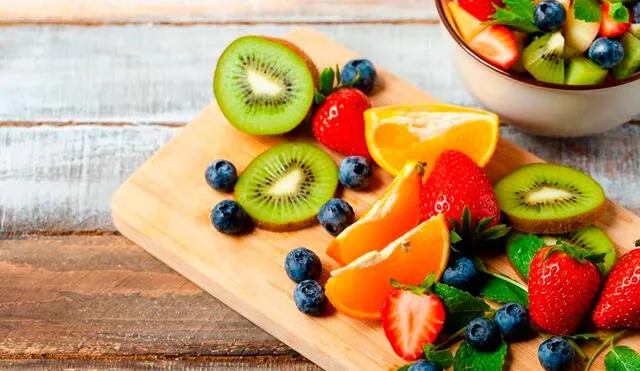Here are the 9 best fruits with the least sugar, according to experts
Fruit can be just as sweet as candy, but if that’s keeping you from consuming the recommended 2 cups per day, there are plenty of options that are lower in sugar.

Low-sugar fruits are typically lower in calories as well, yet they still provide essential fiber, vitamins, minerals, antioxidants, and other plant-based nutrients that make fruit a nutritional powerhouse.
According to registered dietitian Natalie Rizzo, who serves as a nutrition editor for TODAY, the natural sugars in fruit are a healthy part of a balanced diet. Unlike added sugars found in candy or soda, the sugar in fruit provides energy in a much more nutritious way. Some fruits also contain protein, further enhancing their nutritional value.
Which are the 9 best fruit with low sugar, according to dietitians
Since fruit sugars are less intense than those found in desserts and sugary drinks, some people might not find them satisfying enough to curb their cravings. Rizzo suggests pairing fruit with a slightly sweeter component, such as strawberries with dark chocolate chips or apple slices with a touch of Nutella, to enhance the flavor while still being a healthier choice than traditional desserts.
If you're looking for lower-sugar options, here are the fruits with the least sugar:
Berries
- 1 cup of strawberries – 7 grams of sugar
- 1 cup of blackberries – 7 grams of sugar
- 1 cup of raspberries – 5 grams of sugar
Berries are packed with antioxidants, offering protective benefits for the body. They are delicious on their own, in yogurt, or blended into smoothies.
A serving of strawberries meets 100% of your daily vitamin C needs. Raspberries provide the highest fiber content among whole foods, with 8 grams of fiber per cup. Blackberries' rich color indicates the presence of anthocyanins, plant compounds that provide the dark color and act as antioxidants.
Melon
- 1 cup of diced watermelon – 9 grams of sugar
- 1 cup of diced cantaloupe – 12 grams of sugar
Watermelon has more lycopene—a powerful antioxidant linked to reduced blood pressure and stroke risk—than tomatoes. It's also rich in potassium and magnesium, making it a heart-healthy fruit recommended by cardiologists.
Cantaloupe is high in vitamin A, with one cup providing 40% of the recommended daily value, essential for eye health and immune function. It also delivers about two-thirds of the daily value for vitamin C.
Both melons are rich in water and electrolytes, helping hydrate the body.
Citrus Fruit
- One-half grapefruit – 8 grams of sugar
- 1 orange – 13 grams of sugar
- 1 lemon – 1 gram of sugar
Grapefruits and oranges are well-known for their high vitamin C content, an antioxidant that supports the immune system. Eating the pith (the white layer) and membranes is beneficial because they contain many of the fruit's health-promoting compounds.
While lemons are too sour to eat alone, they’re perfect for enhancing sauces, vinaigrettes, and drinks with their tangy flavor and vitamin C.
Kiwi
- 1 kiwi – 7 grams of sugar
Kiwi is another excellent source of vitamin C, as well as vitamin E, which together support skin health. The fruit is also rich in fiber and contains lutein, an antioxidant important for eye health. Studies have found that consuming two kiwis a day can help relieve constipation.
Apricot
- 1 apricot – 3 grams of sugar
Apricots are a great source of vitamin A and beta-carotene. They also provide fiber, which aids digestion by preventing constipation and promoting the movement of food through the digestive system. The soluble fiber in apricots can also help lower LDL cholesterol.
Cranberry
- 1 cup of fresh whole cranberries – 4 grams of sugar
Though fresh cranberries are too tart to eat raw, they are packed with vitamin C, fiber, and antioxidants. They can be a flavorful addition to smoothies, salads, or savory dishes like cranberry avocado salsa.
Plum
Plums are sweet yet low in calories, making them great for satiating hunger. Their high fiber content, particularly soluble fiber, helps slow digestion and keeps you feeling full. The deep purple color of plums indicates they are rich in antioxidants and other beneficial plant compounds.
Papaya
- 1 cup of papaya – 11 grams of sugar
Papaya, known as the “fruit of long life,” offers numerous health benefits. The vibrant orange flesh is packed with magnesium, potassium, folate, lycopene, and vitamins A, C, E, and K.
In addition to these nutrients, papaya contains beta-carotene and lycopene, plus fiber for gut health and potassium for heart health.
Peach
- 1 peach – 11 grams of sugar
Peaches are not only delicious and juicy, but they also pack more fiber, vitamin C, and potassium compared to other stone fruits, according to dietitians. Both the flesh and the skin of peaches are known to have strong antioxidant and anti-inflammatory properties, as studies have shown.
A perfect summer treat, peaches can be enjoyed fresh, tossed into salads, or even grilled for a tasty twist.












